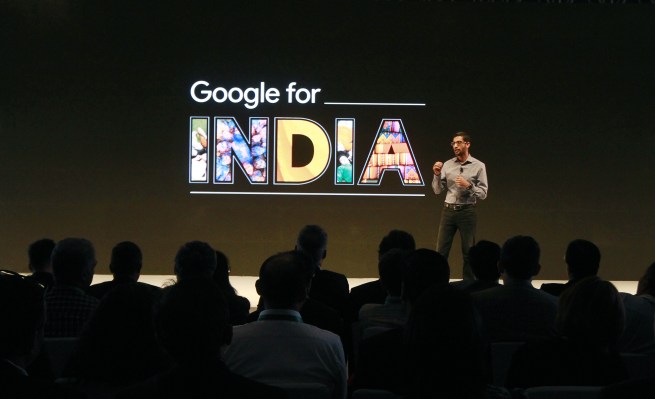
India’s antitrust watchdog has opened an investigation into Google for allegedly abusing the dominant position of its app store to promote its payments service in the world’s second largest internet market.
In its Monday announcement (PDF) about opening an antitrust case against Google, Indian watchdog Competition Commission of India (CCI) said it would review claims of whether the Android maker prominently promotes Google Pay during the setup of an Android smartphone (and whether phone vendors have a choice to avoid this); and if Play Store’s billing system is designed “to the disadvantage of both i.e. apps facilitating payment through UPI, as well as users.”
The informant, who has not been identified, alleged that in addition to Google Play Store’s billing system favoring Google Pay app, in-app purchases for apps downloaded through Play Store are also mandated to support Google Pay service “if they want to be listed on the Play Store” and they are required to pay a “high commission” for that.
The informant also alleged that Google “unfairly” skews the search results on the Play Store in favor of Google Pay app over others — though CCI is not investigating this claim citing not enough evidence to support them. Google “rigs its feature app lists such as ‘Editor’s Choice Apps’, ‘User Choice Apps’ and ‘Top Free apps’ … demonstrating clear bias in favor of its own app; by manipulating the search advertisements algorithm on the Play Store in favour of Google Pay.”
“The informant pointed out similarities between the conducts of Apple in Europe and Google in India i.e. like Apple (as set out in the Press Release of EC), as a mandatory requirement for listing on the Play Store, Google requires the app developers to exclusively use Google Play Store’s payment system and Google Play In-App Billing for charging users who purchase apps on the Play Store or buy goods/services from inside an app (i.e. IAP), and further like Apple, Google charges app developers a 30% commission for allowing them to use the Play Store’s payment system and Google Play In-App Billing,” the Indian watchdog said.
Google told CCI that Android “is not dominant in India and it faces significant competition from feature phones OSs (operating systems) as feature phones sold in India today boast the functions and performance that the Informant attributes to smartphones. Moreover, Android is claimed to be facing significant competition from licensable and non-licensable OSs,” the Indian watchdog revealed.
According to research firm Counterpoint, Android powers 99% of all smartphones in India. Google also disputed other allegations. For instance, it said, “Google’s 30% (and in certain circumstances, 15%) service fee is not arbitrary. It is market based, legitimate, and pro-competitive as the service fee allows Google to cover third party fees and support its significant and continued investments in Play, including the vast resources it develops for developers.”
If the allegations provided by the informant are found credible, Google’s practices could be in violation of various provisions of Section 4 of India’s Competition Act of 2002.
Google Pay, formerly known as Tez, is one of the most popular payments services in India. It competes with Walmart’s PhonePe, Paytm and a range of other apps. As of last month, Walmart’s PhonePe was slightly ahead of Google Pay in India. Both the apps individually process roughly 40% of all transactions on UPI, a payments infrastructure built by large banks in the country. UPI is the most popular digital payments solution in India.
Google Play Store supports a range of payment methods, including credit cards, mobile wallets, internet banking and UPI. But, as the informant alleges, “UPI based digital payment apps are more convenient, secured, economical, etc. over other digital payment solutions.” Based on such distinct features, the Indian watchdog said, “the Informant has averred that the market for apps facilitating payment through UPI is a separate relevant market as users do not regard apps facilitating payment through UPI as interchangeable or substitutable with other modes of digital payment.”
The new antitrust case is the latest headache for Google in India, its biggest market by users. In recent months, the dominant position of Android has irked many startups in the country, who have formed an informal coalition to fight back the Android maker. Following a recent backlash in India by these startups, Google postponed the enforcement of its new Play Store billing rule in India to April 2022. To be clear, CCI is investigating the complaint that was filed in February this year, so it is not directly linked with any recent incidents.
In a statement on Monday, a Google spokesperson told TechCrunch, “We are pleased that the CCI has rejected several claims made by the anonymous complainant. On the remaining concerns, first, we are confident that the CCI will find that GPay operates in an extremely competitive environment, and owes its success to its ability to offer consumers a simple and secure payments experience.”
“Secondly, numerous distribution channels exist for apps on the Android platform; Play is not the only app distribution option for Android. Users choose Google Play because we ensure a safe, secure, and seamless experience. Play’s billing system is a fundamental part of meeting this user expectation and helps ensure our continued investment in the many important things needed to make developers successful.”
Google is potentially facing two additional antitrust investigations in India over allegedly abusing the dominance of Android in the smart TV market, and dominance of Android in the mobile market, according to Reuters. In China, according to the news agency, Google is facing an antitrust probe into allegations that it used its Android OS to stifle competition.
This story was updated with additional details, context and Google’s statement.





